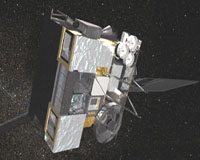 |
Copenhagen, Denmark (ESA) Dec 07, 2009 Government representatives from around the world will gather at the UN Climate Change Conference in Copenhagen, Denmark, 7-18 December, to negotiate a deal to restrict emissions of heat-trapping gases that drive climate change. ESA will attend the conference - also known as COP15 as it will be the 15th Conference of the Parties to the UN Framework Convention on Climate Change (UNFCCC) - to present how satellites are playing an important role in observing the many aspects of our ever-changing planet. The representatives are expected to decide on the future extent of reductions in greenhouse gas emissions by working out a new international agreement before the Kyoto Protocol expires in 2012. The Protocol commits its signatories to reduce levels of greenhouse gas emissions by 5%, from 1990 levels, between 2008 and 2012. To understand better how the carbon that mankind is injecting into the atmosphere finds its way into natural reservoirs in Earth's oceans, land surfaces and vegetation, climate scientists use Earth observation satellites to obtain a global perspective. ESA will maintain an exhibit throughout COP15 and host a special side event on Earth observation satellites and systematic global climate observations. These events will highlight the major contribution that the Global Monitoring for Environment and Security (GMES) programme is now bringing, by assuring continuous global observations of many essential climate variables needed by the UNFCCC for the next 15-20 years. The exhibition, hosted in partnership with the Danish Ministry for Science, opens to the public at Kongens Nytorv in the city centre and will run until the end of the conference. The rate at which global climate change is happening is arguably the most pressing environmental challenge facing the world today. The consequences of a warming climate are far-reaching, potentially affecting fresh water resources, global food production and sea level, and triggering an increase in extreme-weather events. Earth's climate has always varied naturally, so separating natural variability from changes induced by human activity is important for confronting today's challenges. Information provided by satellites is crucial for measuring these parameters. Over the last decades, satellites have provided an ever-clearer picture of the health of our planet and the signs of climate change. These data are provided to the scientific community to improve our understanding of the 'Earth System' and help to predict future climate. The data also form the basis on which policy-makers can build the most effective strategies for adapting to and mitigating the effects of a changing climate.
A European Response Data from archives going back three decades from ESA and Member-State satellites, combined with data from new missions, will be used to produce information on a wide range of climate variables such as greenhouse-gas concentrations, sea-ice extent and thickness, and sea-surface temperature and salinity. These data are required by the Global Climate Observing System to support the UNFCCC and the International Panel on Climate Change. The CCI will provide the international scientific community with a powerful tool to monitor and understand better the state of the climate system and help to predict the effects a changing climate may bring. The initiative promises to be an extremely effective mechanism for providing datasets to governing bodies for managing climate change.
Share This Article With Planet Earth
Related Links UN Climate Change Conference Earth Observation News - Suppiliers, Technology and Application
 GOES-14 (O) Moving Into On-Orbit Storage Around Earth
GOES-14 (O) Moving Into On-Orbit Storage Around EarthGreenbelt MD (SPX) Dec 01, 2009 The Geostationary Operational Environmental Satellite named GOES-14, is being placed in on-orbit storage this month to await its call to duty. Since it was launched, scientists and engineers on the ground have been monitoring the instruments on GOES-14, formerly known as GOES-O, and it is operating well. "The GOES-14 (O) Post Launch Test phase continues with the specification testing of ... read more |
|
| The content herein, unless otherwise known to be public domain, are Copyright 1995-2009 - SpaceDaily. AFP and UPI Wire Stories are copyright Agence France-Presse and United Press International. ESA Portal Reports are copyright European Space Agency. All NASA sourced material is public domain. Additional copyrights may apply in whole or part to other bona fide parties. Advertising does not imply endorsement,agreement or approval of any opinions, statements or information provided by SpaceDaily on any Web page published or hosted by SpaceDaily. Privacy Statement |